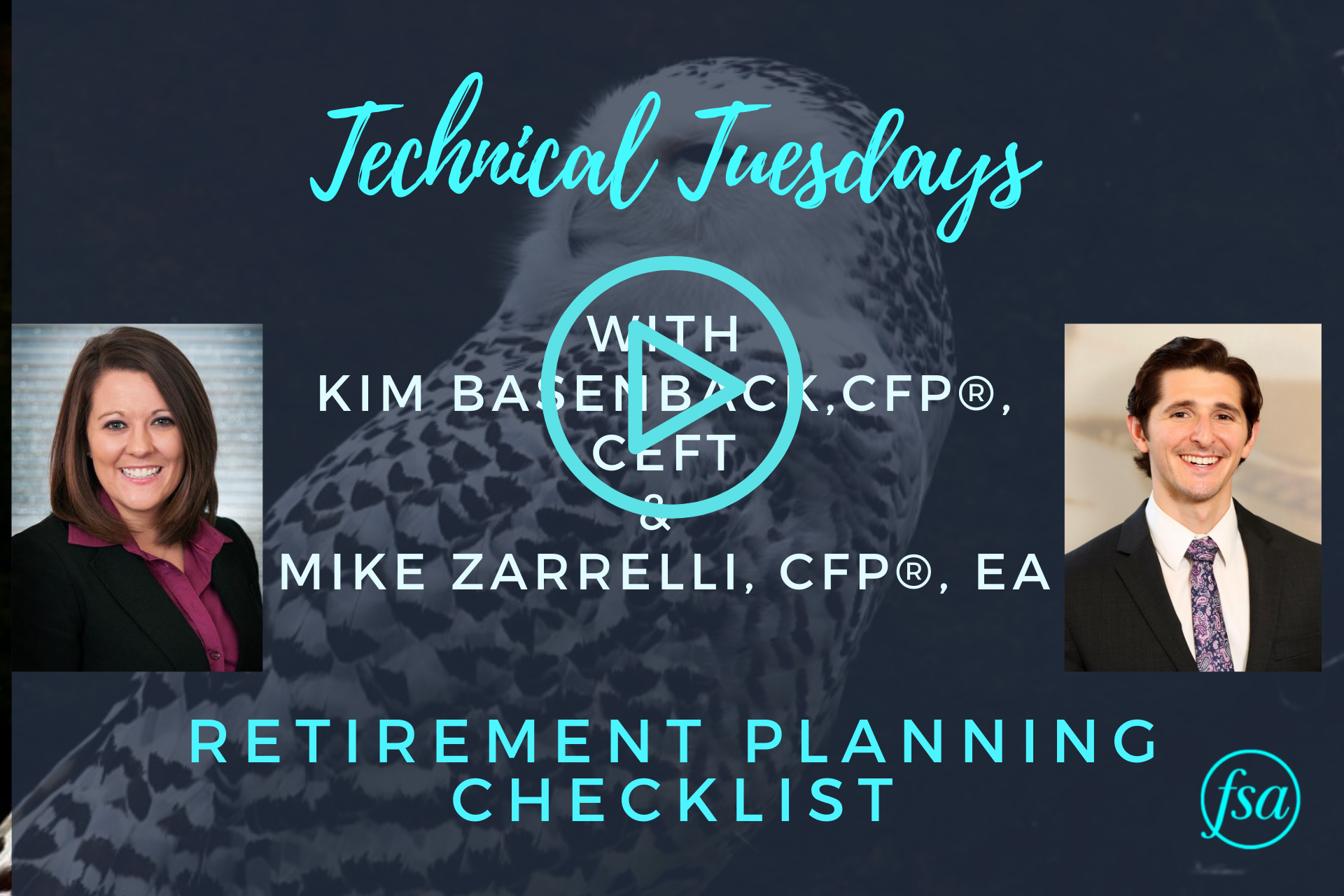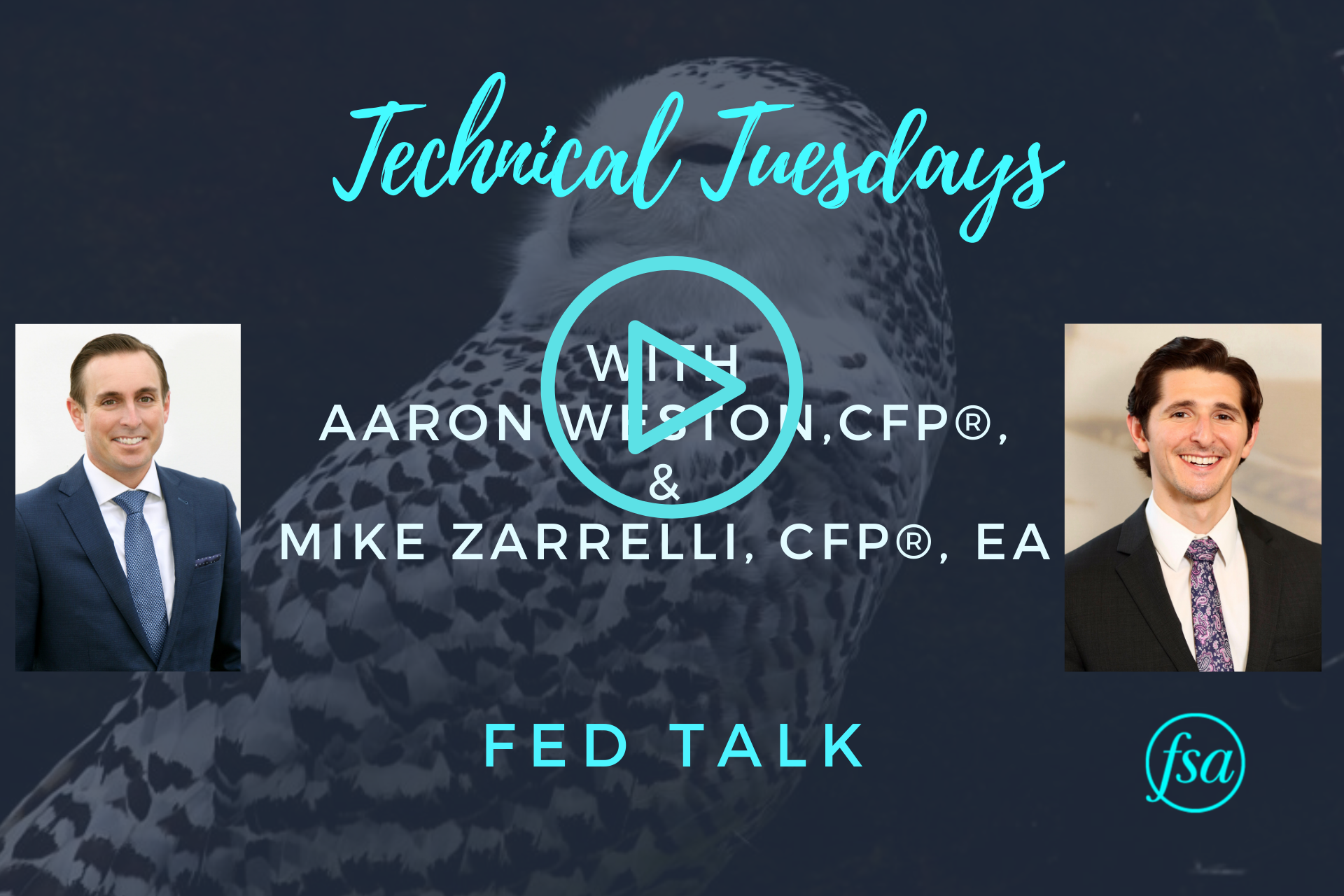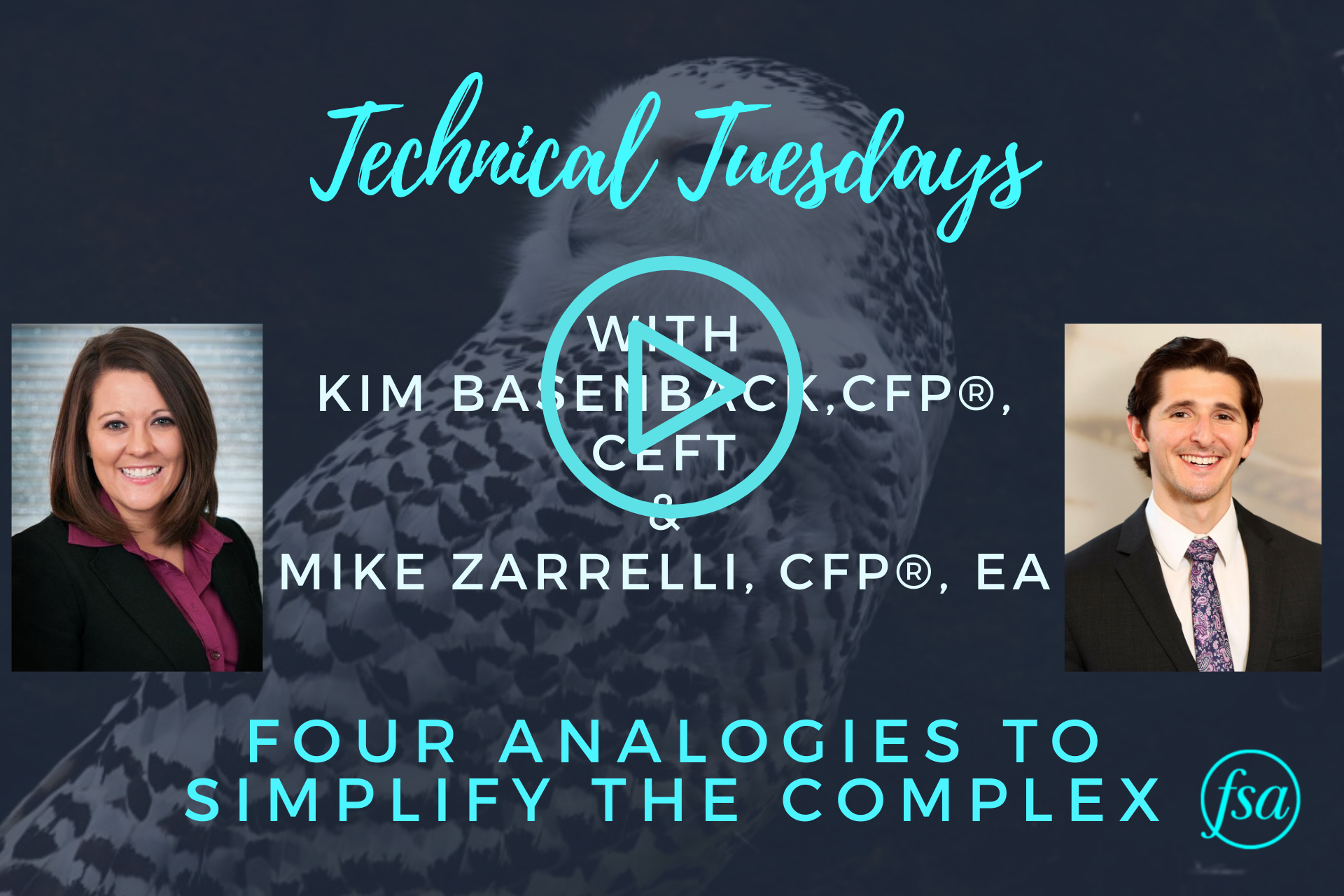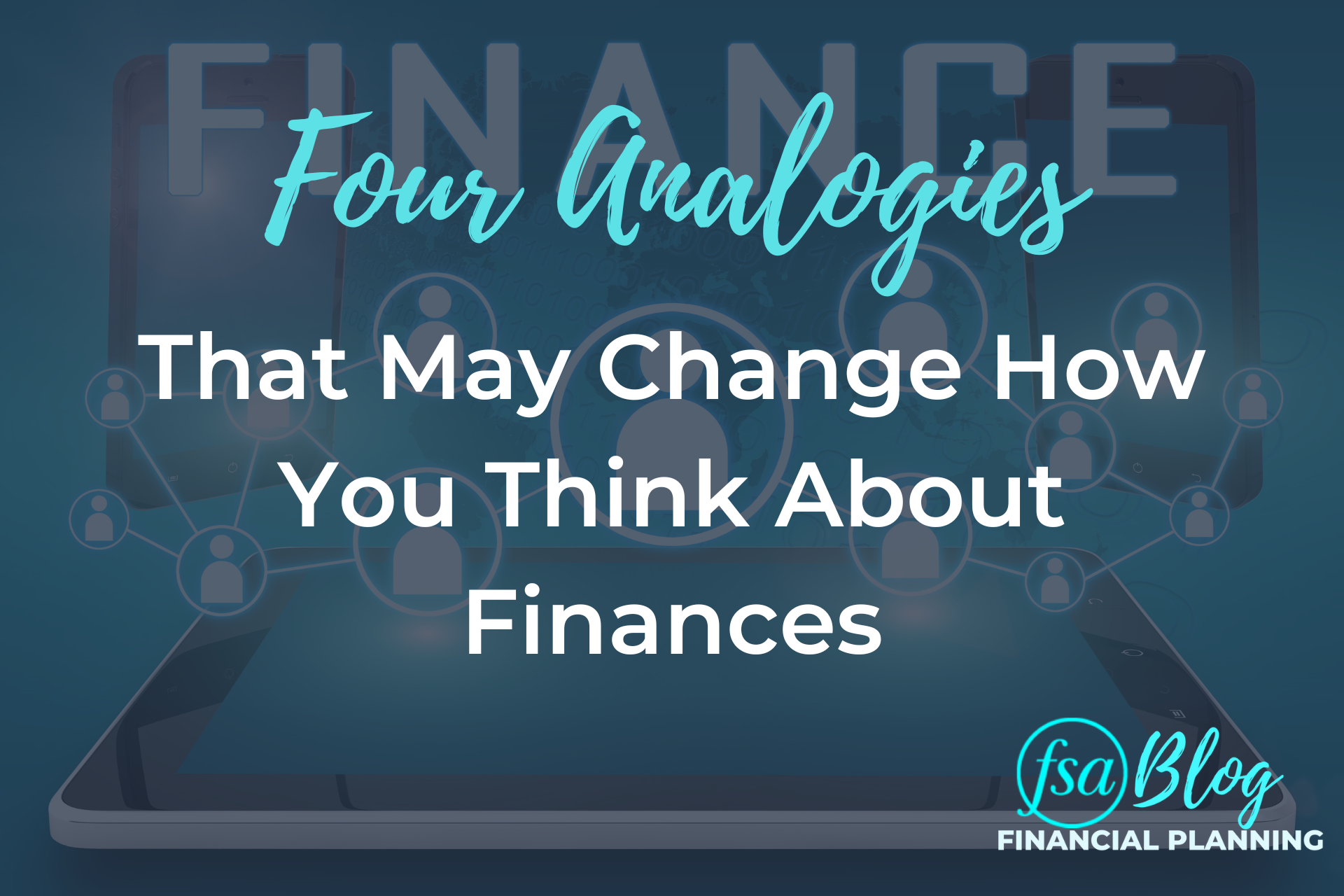Kim Basenback, CPF®, CeFT, and Mike Zarrelli, CFP®, EA, discuss retirement planning and walk through a retirement checklist in this Technical Tuesdays video.
Retirement Planning Checklist Transcript
Mike:
Hey, everyone. Welcome to this month’s Technical Tuesdays. I’m Mike, and this is Kim. And today our conversation topic is going to be going through a retirement checklist or a basic retirement plan. And the reason this came to our minds is because retiring is one of the biggest transitions in your life. You’re going to an unknown space, which can really be kind of scary. So that’s why we think it’s really important to make sure you cover all of your bases before flipping the switch.
So Kim, why don’t you kick us off? What would you talk through or think through first?
Kim:
Sure. And you may expect us to jump right into the financial aspect, but actually, it’s also really important to consider the emotional and psychological impact of retiring. It’s not just you’re ending work. What are you retiring to? What is your purpose? Retiring can be a big mental shift. Not can be, it is a big mental shift. Over the past 30 or 40 years, you most likely spent 40 plus hours a week working at your job. This can become part of your identity. So when you flip that switch and retire, it’s good to think through first, what do you want to spend your free time on and what clubs or traveling do you want to do? Where do you want to volunteer? Do you want to spend more time with family or a combination of all these things?
Really thinking through what you want your retirement to look like beforehand can save you a lot of stress. And then in addition to that, your social aspect. Again, you spend a lot of time with the people at work, and that can be a big part of your social community during your working years. So what does that community look like once you retire? What’s that human interaction? Again, there’s clubs, activities, or other social events that you may want to spend your time doing.
So, Mike, what would you cover next?
Mike:
Now that we’ve got the emotional side covered, we can get into the financial stuff. And really there’s three basic domains when you start looking at your overall financial health. The first is going to be the savings and investments. Do you have a solid emergency fund so that way you can just handle those emergencies which are bound to happen? What about your investments? Do you have enough investments in different buckets or account types to fund your retirement lifestyle?
And then shifting towards debt management, most people say, “I want to retire with no debt.” And while that’s a great aspiration, it’s either not always attainable or advisable depending on your interest rate. So we definitely want to make sure that you’re comfortable with making those monthly payments throughout your whole retirement.
And then the last thing is going to be budgeting. And this one is very, very crucial. Crafting a realistic post-retirement budget can make or break your retirement just because there are several expenses that will either fall off or be added when you retire. So, we definitely want to make sure that’s covered.
With the budget out of the way, Kim, what would you talk through next?
Kim:
Sure. So, it’s important to know where your income’s coming from. So, how are you going to cover those expenses? So, that can come from several sources. Often social security is one of them. And not just what will your social security income be, but how can you optimize it? You can think through the strategies to best optimize, whether it’s you, whether it’s a couple, to make sure that you’re getting the most out of your social security benefit.
And another spoke is often pensions, a little less common these days, but still out there. If you have a pension, it’s good to know they’re not all equal, so it’s good to know yours specifically. Does yours have a cost of living adjustment? Is there a survivor benefit? All of these things impact your cash flow and are really important to know beforehand.
And then also, since you already made your retirement budget that Mike mentioned, you can determine how much of your fixed income is going to cover your expenses and then whatever’s remaining would have to come from your investments. Mike, do you want to cover that piece?
Mike:
Yeah, absolutely. When you turn to your investments, it’s also a scary topic because you know that the value that you retire with is going to need to last the rest of your life. And one or two investment mistakes or periods of poor markets right as you retire can have a massive impact on your retirement. So we’re going to want to make sure that you’re, one, comfortable with the amount of risks that you’re taking; you don’t want to be seasick in your retirement. And then, two, that you have the right mix of assets to diversify your portfolio and just be able to handle those downturns a little bit better.
And then the next question is going to be, and this is a difficult one to answer, how long will your portfolio last and how much can you withdraw from it each year? To get this number, you’re going to need to review your portfolio, its performance, and compare it to your income needs every single year. That’s a tricky equation, so often it’s best to work with a professional to really determine the distributions your portfolio can handle.
So, Kim, let’s talk about the biggest expense retirees may exhibit in retirement.
Kim:
Healthcare. This is, as Mike said, commonly the biggest expense that you’re going to face. So we want to make sure we plan for it and you’re prepared for it. So when your employer-sponsored plan ends, it’s important to know where you’re going healthcare wise from there. If you’re under 65, this would mean you’re not quite to Medicare age, so you’d need to cover your healthcare expenses on your own, which can be a hefty bill. So it’s important you’re planning for that if you’re retiring before 65. If after 65, then Medicare is where you’d at least start. But Medicare in its own has a lot of different options and things that are good to know and examine before you choose which one you’re going with. So, we actually recommend that you speak to a Medicare professional specifically because they’re going to know the ins and outs and even, depending on what prescriptions you’re on, give you some recommendations.
Along with healthcare, there’s long-term care. So, we get asked about long-term care quite frequently and what we do, and more and more retirees are needing long-term care. And so whether you’re going to cover that from long-term care insurance or from your own investment portfolio, it’s just important that you’ve planned ahead and make sure you account for potentially having that expense during retirement.
That being said, Mike, what else would you want to touch base with on retirees or soon to be retirees?
Mike:
The next one is going to be your tax bracket. What marginal tax bracket you will end up in can really determine what strategies you could employ to lower your overall tax bill throughout your retirement. So, for example, you may be in a lower tax bracket once you stop having those paychecks coming in. What opportunities are there that you could utilize paying lower taxes? One example would be you could have a tax-efficient withdrawal strategy. Maybe you choose one account type over another to fund your withdrawals and your expenses.
Another side would be Roth conversions. You may have heard about that. If you’re in a lower tax bracket now than you will be later, why not take some money out of your IRAs, pay the taxes, and convert it to a Roth IRA and let that grow tax free?
So those are a few strategies that you could implement to utilize the lower tax brackets.
Kim, what’s the last thing that you’ve talked through with a retiree to make sure they’re covered?
Kim:
The last thing we would touch on is having to do with your estate plan. We would all say this is important for anyone over the age of 18. It’s important to have your estate documents in place, but, of course, especially when you’re going to retire, making sure that you have – we call it the package – but so that you have your will, your powers of attorney, which are both financial and healthcare, and then your living will or advanced medical directive. And then often that may include a trust. Depending on your situation, a trust may make sense, but making sure all of your estate documents are in place and have your wishes laid out clearly is important. And then in addition to that, so not only the estate legal documents, but also making sure your beneficiaries are up to date. So all of your retirement accounts are going to flow based on whoever you have listed as the beneficiary, so make sure you have the right people listed.
Mike, anything else?
Mike:
I think that wraps it up. Yeah, that’s a huge one, making sure what your documents say, it says about your beneficiaries. But, as you guys can tell that there’s several areas to review before signing off on your retirement. And, honestly, it can be a lot for one person to handle. But not reviewing your situation and not creating a retirement plan can actually be very detrimental. As the saying goes, proper planning prevents poor performance. If you want help creating your retirement plan, we’re happy to help. Send us an email at questions@fsainvest.com or give us a call at (301) 949-7300.
And lastly, if you like this content, please like and follow for more, and we’re more than happy to make videos about topics you’re interested in. So just leave a comment below and we’ll get to you. See you next time.
FSA’s current written Disclosure Brochure and Privacy Notice discussing our current advisory services and fees is available at www.FSAinvest.com/disclosures or by calling 301-949-7300.




